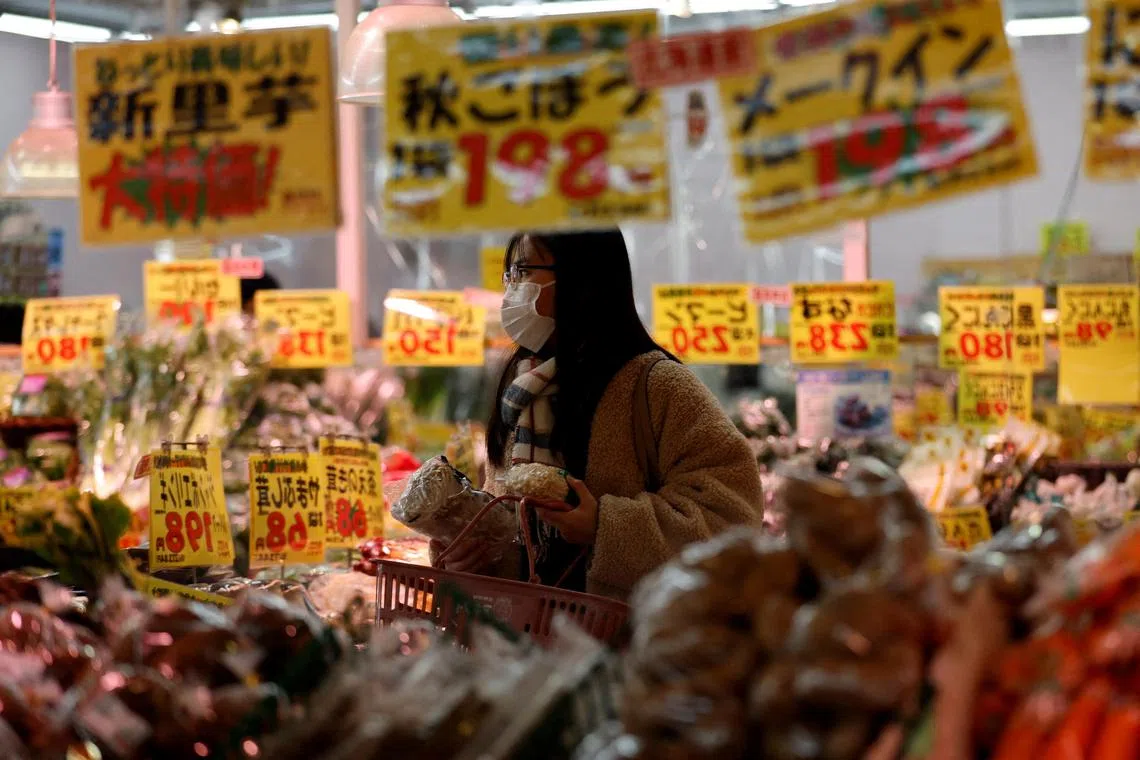Japanese consumers buy discounted ‘expired’ food as prices soar
Sign up now: Get ST's newsletters delivered to your inbox

Some stores report increased sales in discounted products that are either expired, near their expiry, or have their packaging damaged.
PHOTO: REUTERS
Follow topic:
More Japanese consumers are reportedly buying deeply discounted “expired” or “substandard” foods as prices soar in the country.
Some stores in Japan have reported increased sales in discounted products that are either expired, near their expiry dates, or have their packaging damaged.
Ecolo Marche, a discount supermarket located in a residential neighbourhood in Tokyo’s Adachi Ward, has shelves of products advertised as “expired” in large letters on their price tags.
Opened in 2019, the store sells chocolate for 15 yen (14 Singapore cents), mineral water for 11 yen, and salad dressing for 59 yen, reported The Asahi Shimbun. In contrast, the Japanese online supermarket Rakuten retails a bar of chocolate for around 260 yen, a 500ml bottle of mineral water for 130 yen and salad dressing for 270 yen.
Store owner Yusuke Ogata told the Japanese newspaper: “Since last autumn, when prices began to rise, the average spending per customer here has increased 1½ to 2 times.”
Mr Ogata tastes most of the products to check their quality, makes sure to label expired products in large letters, and reminds customers on the expiration date before the transaction is completed, according to The Asahi Shimbun.
According to the Singapore Food Agency, the safety of food products is not solely dependent on expiration date. “Best before” dates are for food with a longer shelf life and indicates when the food will be at its best quality.
But “use-by” dates are for highly perishable products such as milk and yoghurt, which consumers are advised not to consume beyond the stated dates.
Maruyasu, a supermarket chain that sells discounted products nearing expiration dates or in damaged packaging in six locations in Tokyo and Saitama Prefecture, said its sales have increased about 1.3 times compared with a year ago, according to The Asahi Shimbun.
Memberships went up at Kuradashi, an online marketplace that sells about 3,300 products at low prices, including food products nearing their expiration dates. A company spokesperson told the newspaper that membership in June increased by 25 per cent year on year.
“The number of users has increased over the last two years due to the high cost of living in addition to the Covid-19 pandemic,” the spokesperson said.
According to The Japan Times, the number of food products in June that have seen or are expected to see price hikes in the first 10 months of 2023 reached 29,106, and has already exceeded the 2022 total of 25,768, citing a survey by credit research firm Teikoku Databank.
Yamazaki Baking, a major Japanese food company, implemented an average price hike of 7 per cent for 227 items in July. Food manufacturing firm Nisshin Seifun Welna also raised the price of its 1kg cake flour mix from 329 yen to 337 yen. More price hikes may come as the Japanese yen weakens, it has been reported.
In an online survey conducted in October, Kuradashi asked more than 3,000 men and women aged 20 to 80 in Japan how the rising cost of living has changed their lifestyles, reported The Asahi Shimbun.
Some 92.8 per cent of respondents said they “don’t care about the appearance (of products) as long as there are no problems with (the) taste or quality”, while 70 per cent said they “are willing to purchase products that are substandard or nearing the expiration date” because they are happy with the lower prices.
Ms Mika Onodera, 44, explained to The Asahi Shimbun that she started using Kuradashi about three years ago to feed her family of nine. Her monthly household food expenses decreased by 10,000 yen to 20,000 yen with Kuradashi.
“I do care about ‘use-by’ dates,” she said, adding that the regulations for expiration dates in Japan are so strict that she does not mind if some products are a week or so past their expiration date.

